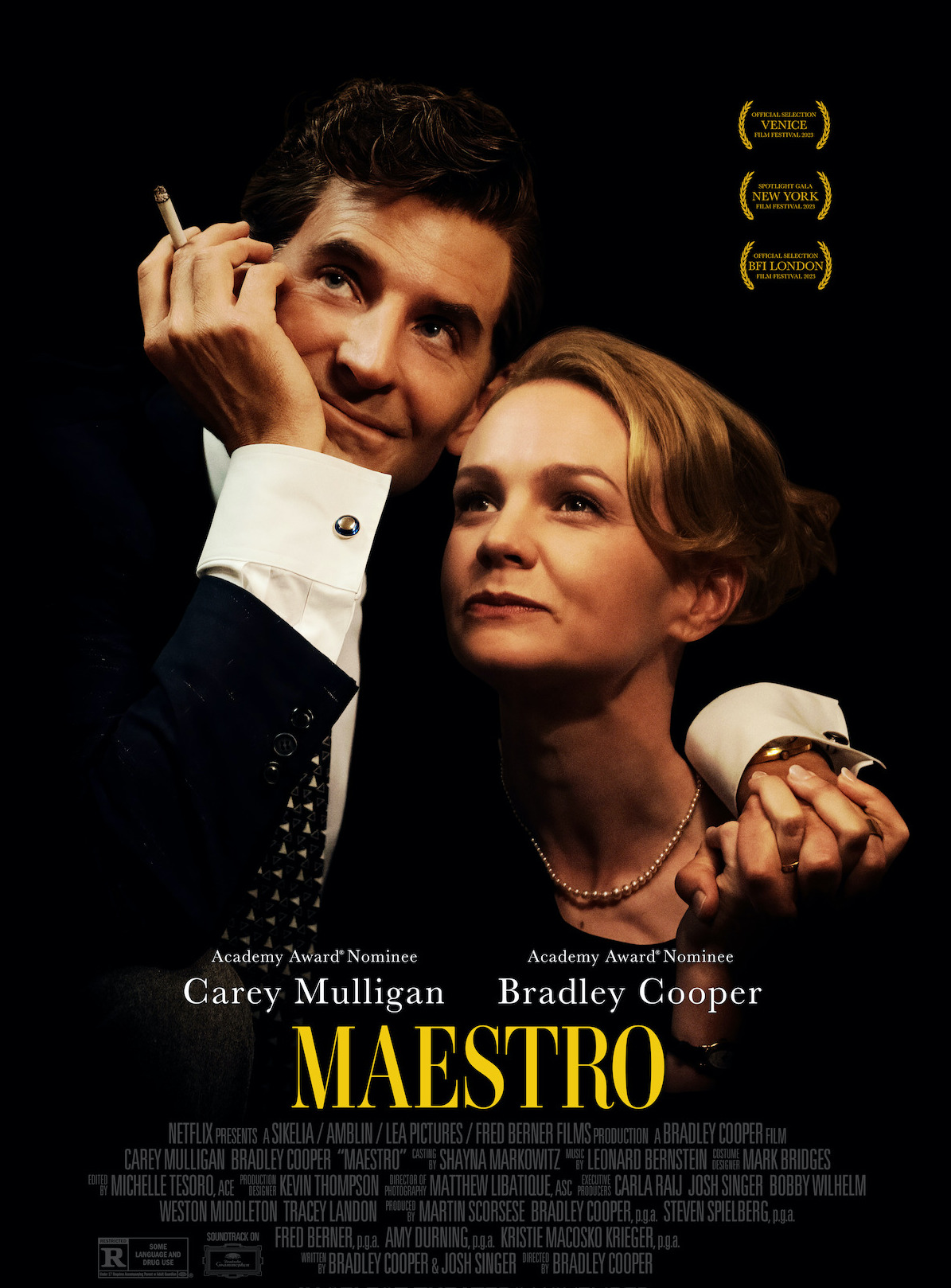 MAESTRO
MAESTRO
Directed by Bradley Cooper
Distributed by Netflix
“IF YOU’RE NOT CAREFUL, you’re going to die a lonely old queen.” That’s a harsh caveat, especially when spoken by one’s wife. In Maestro, directed, cowritten (with Josh Singer), and produced by Bradley Cooper, those lines are delivered by Carrie Mulligan playing actress Felicia Montealegre Cohn, also known as Mrs. Bernstein. Cooper also plays the part of Leonard Bernstein, but his performance takes a back seat to Mulligan’s. An Oscar for Best Actress is widely discussed.
Felicia was far more than Bernstein’s beard; in fact, she was the love of his life. And, for good reason, she was also a cauldron of resentments. After returning from Tanglewood, where rumors of her husband’s gay relations had emerged, she reiterates her only requirement: “I only asked that you be discrete. Don’t you dare deliver the truth!” The pair’s affair begins happily—in black-and-white, perhaps a reflection of the split screen that constituted Bernstein’s sexuality and his life—but before too long, it’s less a marriage than a war zone.
Let’s get “the nose” out of the way at the start. Cooper sports a prosthesis, which sparked a controversy over the possible anti-Semitism of promoting a Jewish caricature. A writer for The New York Times was even spurred to rank it among the worst fake noses in cinema history, including those of Nicole Kidman as Virginia Woolf in The Hours, Orson Welles in A Touch of Evil, and Margaret Hamilton as the Wicked Witch of the West in The Wizard of Oz. Bernstein’s three children fired back to praise Cooper’s creative efforts and to give the schnoz their seal of approval. Anyhow, the nose was probably an unnecessary affectation on Cooper’s part, because all eyes are on Mulligan, who gets top billing in the final credits. “Look at me now. Who’s the one that’s been dishonest? Who misses him now? I miss him. That child of mine? Any questions?” she asks Bernstein’s sister (played by Sarah Silverman).

As an actress, Felicia Montealegre knows how to make a scene. One of the best occurs when, below their bedroom, the Thanksgiving Day Parade is gliding by while the real theatrics are taking place inside their Park Avenue apartment. A Snoopy float bobs outside the window in a scene in which Felicia is enraged that their privately open marriage might become public knowledge. “It’s so draining, Lenny,” she protests, “draining to accept someone who doesn’t love and accept themselves, and that’s the only truth I know about you.” Truth, or the lack thereof, is the overriding premise in this portrait of a messy but enduring marriage. As there isn’t a scene in which either Bernstein or Felicia isn’t smoking, Maestro also serves as a helpful PSA: Quit while you still can!
Ever since 1943, when he was informed that he had to fill in for Bruno Walter and conduct, at a moment’s notice, the New York Philharmonic at Carnegie Hall, Bernstein brought a theatricality to the role, turning the conductor’s baton into a wizard’s wand. Without him, we would have no Gustavo Dudamel or the fictional Lydia Tár. Yet the maestro was racked by self-doubt. “When you add it up,” he tells an interviewer, “there is not much that I created.” But who needs more than the score to On the Waterfront (1954) and, three years later, the electric score that runs through West Side Story? Maestro culminates in 1973 with Bernstein commanding the lectern at England’s Ely Cathedral, slashing his way through Mahler’s Second Symphony.
At the end, one’s heart cannot break for Bernstein, who is as sweaty as ever, looking almost reptilian on a dance floor, deliriously drunk and nearly falling over to “Shout” by Tears for Fears. If he doesn’t look like a lonely old queen, he looks like the offspring of an iguana and a desiccated mummy, unhealthy and broken with time and self-abuse. Felicia’s early warnings, and prognostications, turned out to be valid: “Don’t forget you’re a man,” and “Fix your hair. You’re getting sloppy.” What if the musical culture that Bernstein helped to shape had said in response, “Shout, shout, let it all out”?
Colin Carman is a professor of English Literature at Colorado Mesa University in Grand Junction, Colorado. He is the author of The Radical Ecology of the Shelleys.





